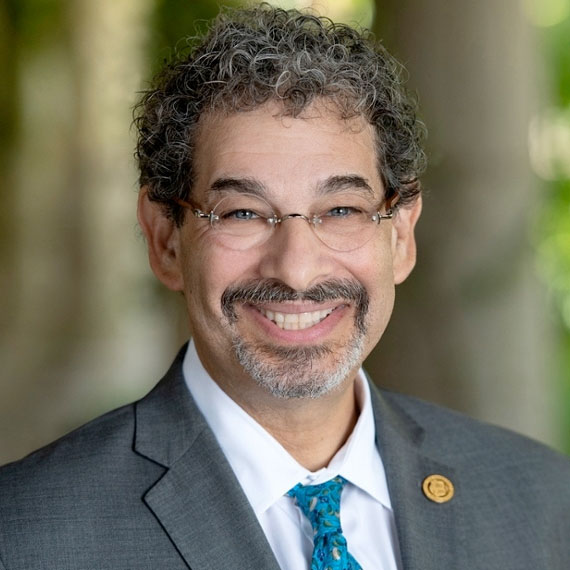Bridging the Gap Series : February 2021
Introduction from Vice Chancellor Steve Goldstein
The heart of good health in any community depends on its primary care providers. Primary care is critical to supporting wellness through prevention, early diagnosis of disease, and for those who require complex care, guiding the patients they know so well to specialists if needed and back to health. Recognizing this makes it clear that investing in primary care is a key strategic element to improving health equity in diverse communities.
Intermittent care in emergency rooms and urgent care facilities fails to provide the benefits of ongoing clinical relationships. It is more expensive both in the first instance and in the long term because diseases are more advanced when they present and outcomes less positive. Providing all members of society with access to primary care is essential to the good health of individuals and also to their neighborhoods. Offering primary care in the community provides a window at the ground level so health promoting strategies can be designed to fit the unique risks and diverse natures of that community.
In this essay, Dr. Cynthia Haq, chair of the Department of Family Medicine in the School of Medicine, expands on the importance of family physicians and other primary care providers in improving health equity. We see here the crucial connection of primary care and health equity. This is a call to action to improve health in Orange County and across the country.
By Cynthia Hag, MD, Clinical Professor and Chair, Department of Family Medicine
Our nation is facing a current and growing shortage of family physicians and other primary care doctors and nurses, posing a serious threat to addressing health inequities. According to the American Academy of Family Physicians only 13% of medical school graduates are currently matching into family medicine. This rate would need to increase to 25% to ensure adequate access to primary health care for the nation. A key to tackling health inequities is the critical and often under-appreciated role that family medicine plays in improving access to healthcare. Family physicians can improve health outcomes for everyone. They make especially significant impacts on society’s most vulnerable populations. Now more than ever there is a need for investment in family medicine.
Primary health care may be provided by family physicians, general internal medicine physicians, general pediatricians and advanced practice providers such as nurse practitioners or physicians assistants, also known as primary care providers (PCPs). Access to primary health care reduces inequities, improves access to preventive services and early detection of diseases, provides management of acute and chronic diseases, and reduces health care costs. Patients without PCPs are less likely to receive preventive services or follow-up on chronic disease management, and are more likely to misuse (and consequently overburden) emergency departments to address needs that could be managed more cost-effectively in primary care.
Family physicians are our very best first line to the bridge the gaps between vulnerable patients and health systems since they care for all patients regardless of age, gender, or socioeconomic status. They provide continuity of care from ‘womb to tomb’, employ an integrative, biopsychosocial approach, and serve as advocates for their patients’ health. By caring for patients in the context of their family and community, family physicians become familiar with local conditions and can guide their patients to the most appropriate treatments and resources. Health care provided by family physicians leads to improved health outcomes and lower costs.
The pandemic has amplified health inequities and gaps in access to healthcare in California and the nation. Millions have lost their jobs and health insurance. People without health insurance are less likely to have a source of regular primary care. UCI Family Medicine, Pediatrics, and Obstetrics and Gynecology faculty, residents, medical students and nurses are addressing these gaps through their dedicated services in the Family Health Centers located in Santa Ana and Anaheim. These federally-qualified community health centers provide primary care for people who have been historically disadvantaged and are living on low incomes. UCI Family Health Centers serve all patients, regardless of their socio-economic or insurance status, race, religion, gender identity, sexual orientation or political affiliations. UCI Health prioritizes diversity and inclusive excellence for faculty, staff and trainees to reflect the diversity of the patients and communities we serve.
UCI Health is committed to expanding access to primary health care and family medicine for Orange County. As UCI Health works to Bridge the Gaps, we recognize family physicians are uniquely positioned to care for all patients in the context of their family and community. Investing in family medicine will allow patients to access the right level of care at the right time and place. This is part of our commitment to promote health equity and to provide high quality, cost effective health care at the community level.

Started in June 2020, Bridging the Gap is a series curated by Vice Chancellor Steve Goldstein, as a way to examine and share our work in closing all gaps to achieve health equity through awareness, understanding, compassion and action. You can also receive the series in your inbox by subscribing to the newsletter.
Category: Digital Publications